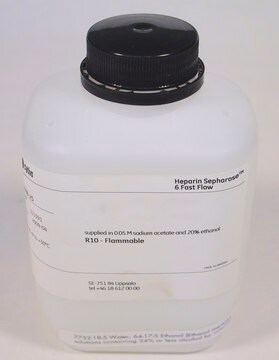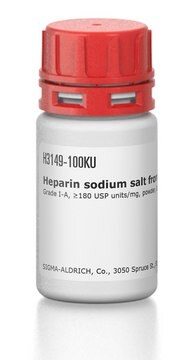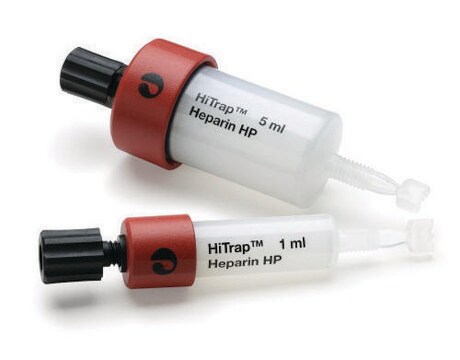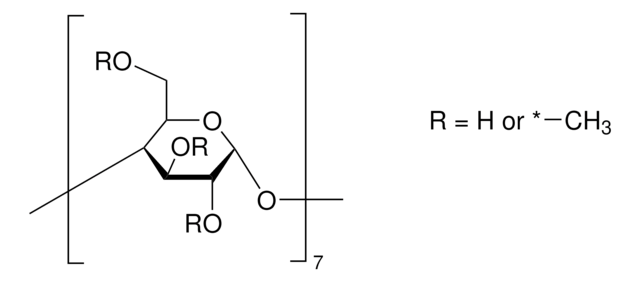H0402
Heparin−Agarose
(1:1 suspension in a 20% ethanol solution)
Faça loginpara ver os preços organizacionais e de contrato
About This Item
Produtos recomendados
fonte biológica
heparin from Porcine intestinal mucosa
Nível de qualidade
Formulário
(1:1 suspension in a 20% ethanol solution)
Matriz
4% beaded agarose
ativação da matriz
epichlorohydrin
ligação da matriz
terminal aldehyde by reductive amination to amine linker
espaçador de matriz
7 atoms
capacidade
≥0.5 mg/mL binding capacity (thrombin)
temperatura de armazenamento
2-8°C
Procurando produtos similares? Visita Guia de comparação de produtos
Aplicação
Heparin agarose is developed from porcine intestinal mucosa and is used in affinity chromatography. Heparin agarose has been used in studies to provide information on human monocytic ehrlichiosis, tumor necrosis and the effects of coagulation from Vipera snake venom.
forma física
1:1 suspension in a 20% ethanol solution
Nota de preparo
Prepared by end-point attachment for high-efficiency fractionation of antithrombin III and other specific binding proteins
Palavra indicadora
Warning
Frases de perigo
Declarações de precaução
Classificações de perigo
Flam. Liq. 3
Código de classe de armazenamento
3 - Flammable liquids
Classe de risco de água (WGK)
WGK 3
Ponto de fulgor (°F)
104.0 °F - closed cup
Ponto de fulgor (°C)
40 °C - closed cup
Escolha uma das versões mais recentes:
Já possui este produto?
Encontre a documentação dos produtos que você adquiriu recentemente na biblioteca de documentos.
Kenji Kashiwagi et al.
Biomaterials, 30(6), 1166-1175 (2008-11-22)
Efficient immobilization of biomacromolecules on material surfaces is a key to development in areas of regenerative medicine and tissue engineering. However, strong and irreversible immobilization of cytokines on surfaces often diminishes their biological functionality. A destructive hydrophobic interaction between the
W H Yu et al.
The Journal of biological chemistry, 275(6), 4183-4191 (2000-02-08)
Many matrix metalloproteinases (MMPs) are tightly bound to tissues; matrilysin (MMP-7), although the smallest of the MMPs, is one of the most tightly bound. The most likely docking molecules for MMP-7 are heparan sulfate proteoglycans on or around epithelial cells
Glycosaminoglycan binding assays.
A J Hoogewerf et al.
Methods in molecular biology (Clifton, N.J.), 138, 173-177 (2000-06-07)
B A Kluszynski et al.
The Journal of biological chemistry, 272(21), 13541-13547 (1997-05-23)
We have studied the ability of histidine-rich glycoprotein (HRG) to neutralize the anticoagulant activity of heparin in plasma and in a purified component clotting assay. Addition of HRG to plasma or to the purified component assay did not neutralize the
Miriam Corredor et al.
Biophysical journal, 110(6), 1291-1303 (2016-03-31)
Semaphorin3A (Sema3A) is a vertebrate-secreted protein that was initially characterized as a repulsive-guidance cue. Semaphorins have crucial roles in several diseases; therefore, the development of Sema3A inhibitors is of therapeutic interest. Sema3A interacts with glycosaminoglycans (GAGs), presumably through its C-terminal
Nossa equipe de cientistas tem experiência em todas as áreas de pesquisa, incluindo Life Sciences, ciência de materiais, síntese química, cromatografia, química analítica e muitas outras.
Entre em contato com a assistência técnica








